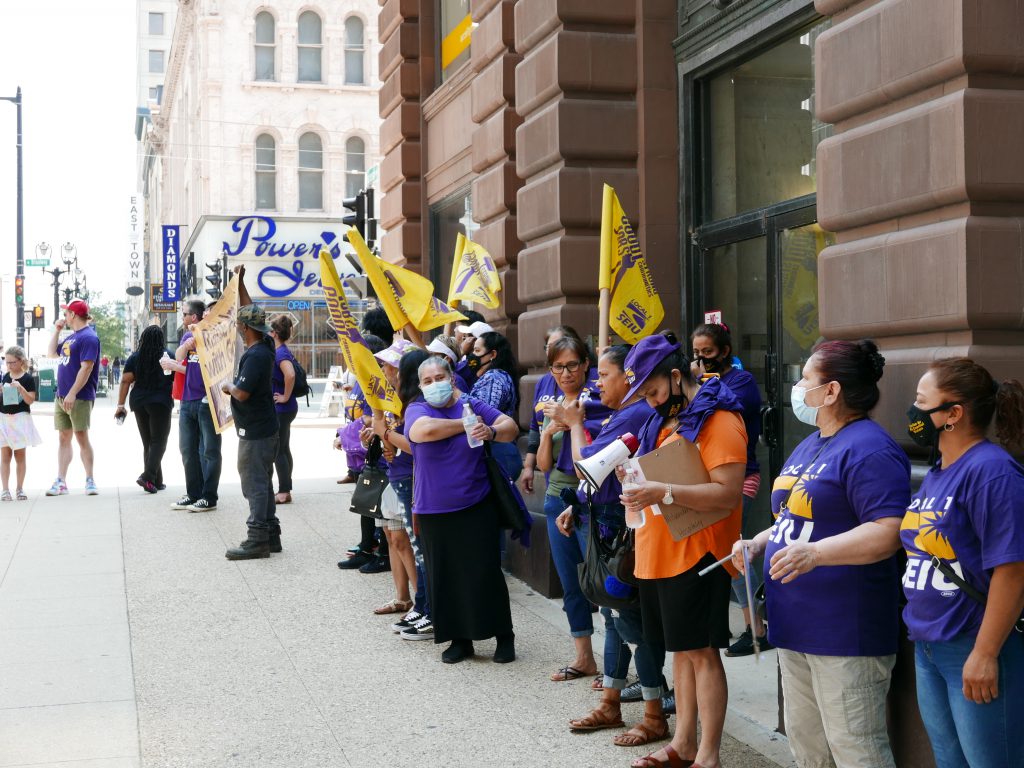Unions Seek $15 Wage for All Janitors
They want $15 starting wage, uniform standards for all janitors, sanitation workers in the county.

SEIU Local 1 janitors rally Downtown for $15 an hour. Photo by Graham Kilmer.
Several dozen union janitors and professional cleaners rallied Tuesday in downtown Milwaukee to remind their employers that they want $15 an hour — and they want it now.
The union, represented by Service Employees International Union Local 1, includes hundreds of janitors and sanitation workers in the majority of downtown office buildings that began contract negotiations Tuesday with the approximately dozen contractors that employ them.
In this bargaining session the workers are seeking $15 an hour as a starting wage, up from the current $13.60 an hour. But the union is also trying to negotiate a contract that will cover all the workers employed in the Milwaukee area by the nine contractors negotiating with SEIU affiliated workers on their latest contract.
“It’s a pretty incredible moment where janitors are going to the table not only saying we need a living wage but we want to make sure that everyone that does this work like us has a living wage and has rights, has security on the job, too.”
The workers rallied Tuesday in front of the Railway Exchange building at the corner of E. Wisconsin Ave. and N. Broadway. Across the street, their employers were caucusing together to prepare to begin negotiations with the union’s bargaining team.
Before beginning a chorus of chants, one of the organizers tried to fire up the crowd by reminding them that the white collar employees they were demanding a living wage from would all be heading home and enjoying the Bucks game as they would be in the buildings working.
The contract will cover the vast majority of sanitation workers in large downtown buildings, but Rickman said the goal is to expand this: “One of the main fights in this contract negotiation is gonna be about whether that geographic area expands and how it might expand to cover other parts of the city.”
The contractors that have employees working in Downtown also have employees in businesses and business parks throughout the city and the county. The union is attempting to negotiate for better wages “guaranteed rights, respect, security and dignity on the job,” on their behalf, Rickman said.
“This contract is about lifting up a model for how to achieve what we call sectoral bargaining or industrial bargaining,” he said. “Everybody in the industry sits at the table together to figure out what the common standards are.”
The janitors and cleaners with SEIU, and with the help of MASH, are attempting to build off of this model of sectoral bargaining for organizing labor in Milwaukee and raising the wage floor for workers.
Rickman said policy makers in Milwaukee and Wisconsin have long understood the need for raising the minimum wage, but have lacked the power or authority to do so.
State law prohibits local governments from enacting a local minimum wage or even legislating their own employment regulations. Because of this, Rickman said the only way to raise wages is through union contract campaigns and organizing drives that bring hundreds and thousands of workers under contracts with living wages and worker protections.
“We believe that ultimately the way to transform service sector work in Milwaukee is to get all the employers to one table in an industry to talk about wages and benefits and rights on the job,” Rickman said.
Eventually, Rickman said, future contract negotiations should directly involve the powerful, corporate building owners and developers. “It’s the BMO Harris Banks, the US Banks of the world, the Irgens’s of the world… They’re the ones that have the money,” that pay the property service workers contracts, he noted.
“99% of these folks bring a paycheck home to the neighborhoods” of Milwaukee, Rickman noted.
Milwaukee cannot address racial and economic inequality without raising the wages of the service sector working class, Rickman said, which comprises a disproportionate number of Black and Latino people relative to the area’s population.
White-collar diversity and inclusion initiatives are admirable, Rickman said. “But to achieve anything at scale,” he stressed, “is going to necessitate things like raising wages for janitors, raising wages for food service workers, raising wages for security officers.”






















Soon the MMAC will lobby against this. They’re nothing more than the WMC bee atch.